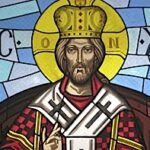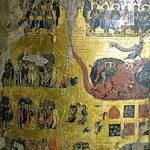Pope Francis’ address to Plenary Session of the International Theological Commission
Thursday, 28 November 2024
Your Eminence, dear brothers and sisters,
We are rapidly approaching the opening of the Holy Door of the Jubilee and we have recently concluded the Sixteenth Ordinary Assembly of the Synod of Bishops.
In the light of these two events, I would like to offer you two points for your reflection:
first, the need to put Christ back at the center,
and second, to develop a theology of synodality.
1. Putting Christ back at the Centre.
The Jubilee invites us to rediscover the face of Christ and to “re-centre” ourselves in him.
During this Holy Year, we will also celebrate the 1700th anniversary of the first great Ecumenical Council, the Council of Nicaea. I am thinking of going there.
This Council was a milestone in the history of the Church but also in the history of humanity,
because faith in Jesus, the Son of God made flesh “for us and for our salvation”, was defined and proclaimed as a light that illuminates the meaning of reality and the destiny of all history.
In this way, the Church responded to the exhortation of the Apostle Peter: “Worship the Lord, Christ, in your hearts, always being ready to give an answer to anyone who asks you for a reason for the hope that is in you”.
This exhortation, addressed to all Christians, can be applied in a special way to the ministry which theologians are called to exercise as a service to the People of God.
They are called to promote an encounter with Christ and a deeper understanding of his mystery
so that we may better comprehend “what is the breadth and length and height and depth, and to know the love of Christ which surpasses all knowledge” (Eph 3:18-19).
The Council of Nicaea, in stating that the Son is consubstantial with the Father, emphasized something essential: in Jesus, we come to know the face of God and, at the same time, the face of humanity, and thus to realize that, in the Son, we are sons and daughters and brothers and sisters of one another.
This fraternity, grounded in Christ, becomes for us a fundamental ethical imperative.
It is significant, therefore, that you have devoted a large part of this Plenary Assembly to working on a document intended to shed light on the timeliness of the faith proclaimed at Nicaea.
Such document could prove invaluable, in the course of the Jubilee Year, in nourishing and deepening the faith of the faithful and in offering, on the basis of the figure of Jesus, insights and reflections useful for a new cultural and social paradigm inspired by the humanity of Christ.
In today’s complex and often polarized world, tragically marked by conflict and violence, the love of God revealed in Christ and given to us in the Spirit becomes an invitation to every man and woman to learn how to live in fraternity and to become workers for justice and peace.
Only in this way can we sow the seeds of hope wherever we live.
Putting Christ back at the center means rekindling this hope, and this is precisely what theology is called to do, with perseverance, wisdom and vision, and in dialogue with all other fields of knowledge.
2. the need to develop a theology of synodality
This brings us to the second point, which is the need to develop a theology of synodality.
The Ordinary Assembly of the Synod of Bishops devoted a paragraph of its Final Document to the task of theology in the section on ‘Charisms, vocations and ministries for mission’; and offered these words of encouragement: “The Assembly invites theological institutions to continue research aimed at clarifying and deepening the meaning of synodality” (No. 67).
This was a vision of Saint Paul VI when he created the Secretariat for the Synod of Bishops, at the end of the Council,.
Almost sixty years later, this synodal theology has gradually developed and today we can say that it is mature.
Today we cannot think of pastoral care without this dimension of synodality.
Along with the centrality of Christ, then, I would ask you to be mindful of the ecclesiological dimension of synodality, in order to highlight its missionary purpose and the participation of the whole People of God in the diversity of our cultures and traditions.
I would say that the time has come to take a bold step forward in developing a theology of synodality, a theological reflection that can help, encourage and accompany the synodal process, for a new, more creative and daring missionary phase, inspired by the kerygma and involving every component of the Church’s life.
In conclusion, I would like to express my hope that you will be like the Apostle John, who as the beloved disciple placed his head close to the Heart of Jesus (cf. Jn 13:25).
As I said in my Dilexit Nos, the Sacred Heart of Jesus “is the unifying principle of reality, because ‘Christ is the heart of the world; his Paschal sacrifice of death and resurrection is the center of history, which thanks to him is the history of salvation’” (No. 31).
By remaining, as it were, close to the heart of the Lord, your theology will draw from the source and bear fruit in the Church and in the world!
A fundamental condition for a fruitful theology is not to lose one’s sense of humor.
lease! This is a great help.
The Holy Spirit is the one who helps us in this dimension of joy and of good humor.
Sisters and brothers, I thank you for your ministry.
I accompany you with my blessing, and I ask you, please, to pray for me.
For me, not against me! Thank you.


